Much attention was given in the news this week to the announcement that we in Great Britain no longer live in a society of three classes but what does this mean for us and is it important anyway?
Britain is famous for its class system. This is largely due to our long history without internal revolutions or wars. France underwent its revolution which largely rid it of its upper class. Germany lost its when the Nazi’s found Aristocrats to be a hindrance to its social engineering and world domination. Russia and China underwent Communist revolutions in the 20th C, and Italy, Spain, Austria-Hungary and many others either suffered from fascism or war and often both.
What race is to the United States, Class or social standing is to the United Kingdom. It’s not meant to be important and indeed you can live most of your life and not be aware of it, if you choose not to be. Whilst nowhere near as important as it used to be, class differences still exist and therefore to some degree they matter.
Traditionally we were split into three classes. The Upper Class or ruling elite who are closely aligned to the Monarchy and landed gentry, the middle class who were people such as doctors and solicitors who did have wealth but not “good breeding” and the working class who has Marx deduced in the 19th Century provided their labour but did not own any means of production.
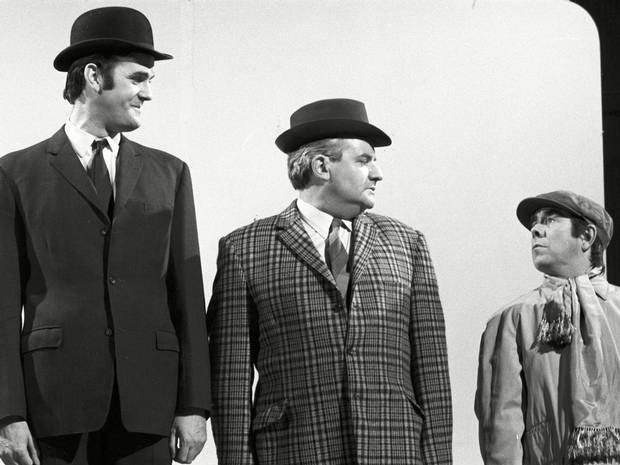
Class was only ever partially related to money. Unlike in countries like the United States where money and star status meant individuals were considered to be at the top of society, here it was mostly due to family ancestry. Though not common, it was entirely possible for an Aristocratic family to be almost bankrupt whilst retaining their upper-class rating that middle class families with more money or assets could never hope to gain.
Overt displays of wealth were and to a degree still are seen as vulgar. True breeding meant one didn’t have to show off. As an example someone like Prince Charles is often seen in the country in old clothes that the average unemployed person would never dream of being seen out with.

Whilst someone like David Beckham might have millions of pounds but will only ever be seen as Middle-Class at best and often no more than a jumped up working-class. The more people like him show off their wealth and glamour with tacky though hugely expensive weddings and try to stress their credibility, the more the real upper class will turn up their noses. Just witness Downton Abbey for evidence of this. It is often said that the truly rich don’t have any need or desire to show off their wealth whereas the new money is always trying to show they have made it and impress those they have left behind.
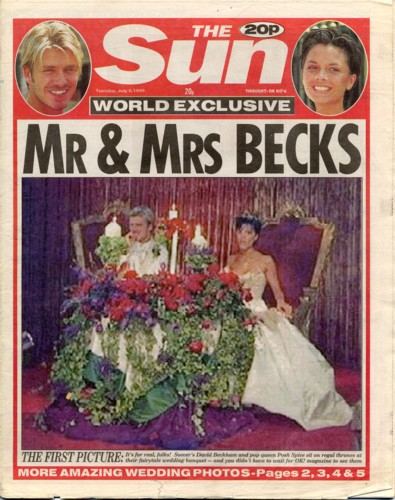
Whilst the Industrial Revolution and world trade led to the rise of what would now be thought of Middle-Class with Industrialists and entrepreneurs setting up businesses and corporations , it wasn’t until the late 19th Century that workers identified themselves as working class. Whilst the Liberal Party did much to improve the plight of the poor before WW1 it was not until the 1920s that the working class got their act together as a political force.
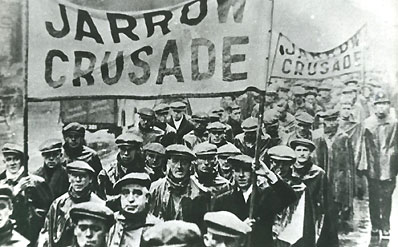
Since then, the notion of class has very much gone downhill and become unfashionable. There is no longer any respect to anyone simply because of their social status or bulging bank balance. The rich try to downplay their background with even the Queen changing her voice to fit in more with normal people. The working class have been encouraged to think their ideas and culture are as good or better than everyone elses. In some way both the working and upper class have tried to eliminate themselves with the vast majority of the country identifying itself as being Middle-Class despite the fact that most people still have to work for a living in relatively dead-end positions and for salaries much lower than their betters.
Whatever is said, class still matters. The vast majority of land and wealth belong to the descendants of a few hundred Norman invaders from 1066. They go to the most expensive private schools and prestigious universities, run most political parties and even take more than their share best or high-profile jobs. It’s surprising for example just how many television stars are from what would be considered upper class backgrounds. Take the historian Dan Snow for example though likeable and talented, he got his break on television in a series with his famous Dad. He might speak in a normal accent but he went to Oxford University, went to a private school and his ancestors include a rather inept officer in WW1 and one of the most famous pre WW1 prime ministers, he is married to the daughter of the 6th Duke of Westminster but he appears to present himself as a man of the people. Like wise Helena Bonham Carter is descended from a 20th Century Prime Minister and Florence Nightingale. These are just two easy to find examples. Does it matter? In some ways not but though every one is entitled to success and a career, how much of theirs is due to their family background?
These days though still important, wealth is not the only defining factor in what class you are. It is quite easy for a very poor working class person to enjoy classical music or read philosophy whilst just yesterday, George Osborne the second most important politician in the U.K. a millionaire and from an Aristocratic background was spotted coming out of McDonalds, something most middle-class folk would never dream of doing, or at least get caught visiting. Despite his hugely wealthy and powerful family background, Gideon George Oliver Osborne was still labelled as an ‘oik’ by his university colleagues who were even more well-bred and who form the basis of our government and leading business and economic institutions.
Other things that give away class include clothing, hobbies and even words. Not just accents but the actual words themselves. This was highlighted by the famous book “U and non-U” meaning Upper Class and none Upper Class with some examples below.
| U | Non-U |
|---|---|
| Vegetables | Greens |
| Scent | Perfume |
| Graveyard | Cemetery |
| Spectacles | Glasses |
| False Teeth | Dentures |
| Napkin | Serviette |
| Sofa | Settee or Couch |
| Lavatory or Loo | Toilet |
| Lunch | Dinner (for midday meal) |
| Pudding | Sweet |
To show how messed up I am, I have highlighted the words that I use. Going by the above it would seem I have a bit of both in me, maybe that makes me middle class?
This week though as a result of a study of over 160,000 people it has been announced that there are now 7 social classes. This takes into account various factors such as friends, social media, hobbies, job status and of course wealth. You can try the test for yourself here
Below are a number charts that indicate the new typical classes.
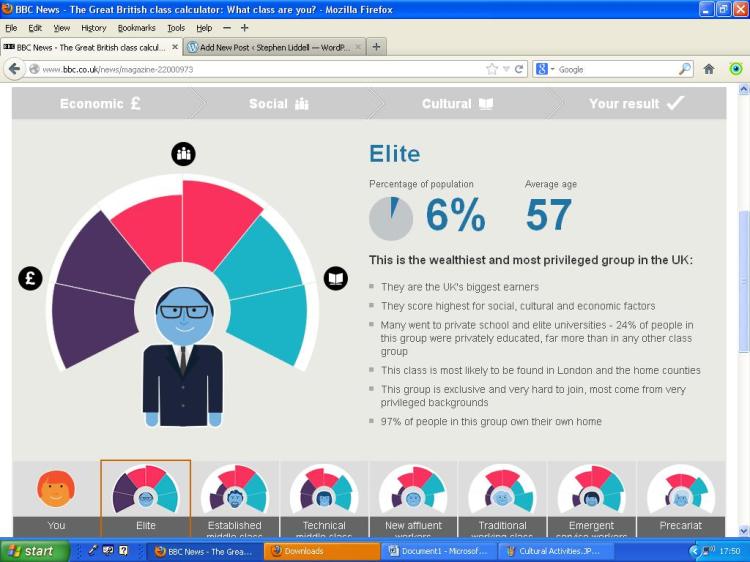
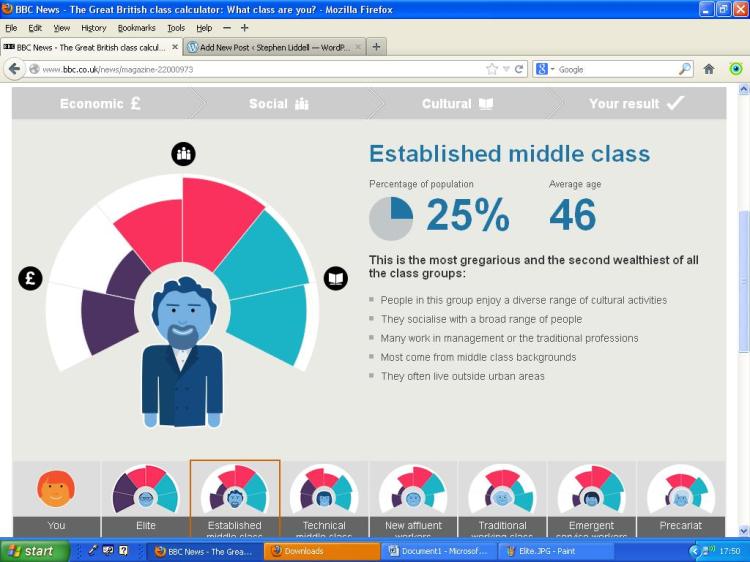
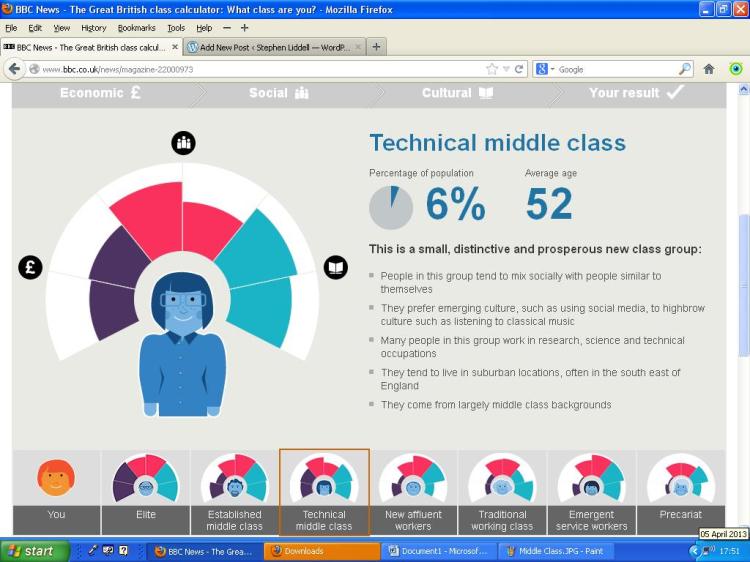
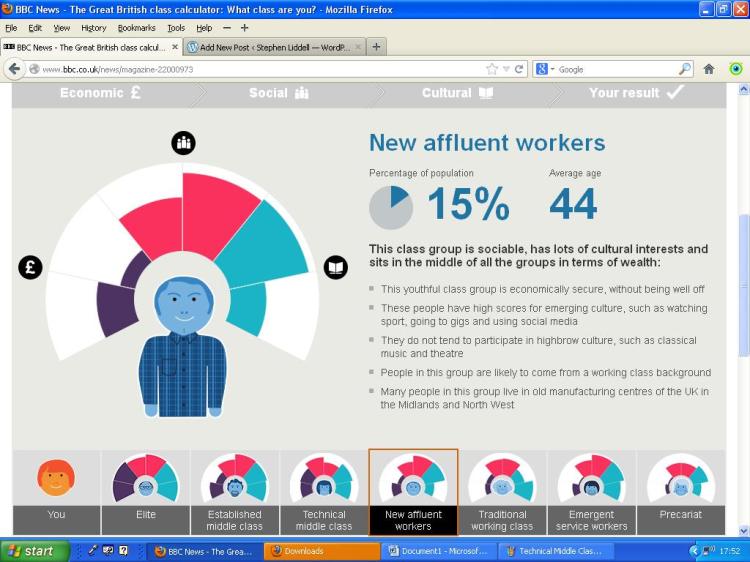
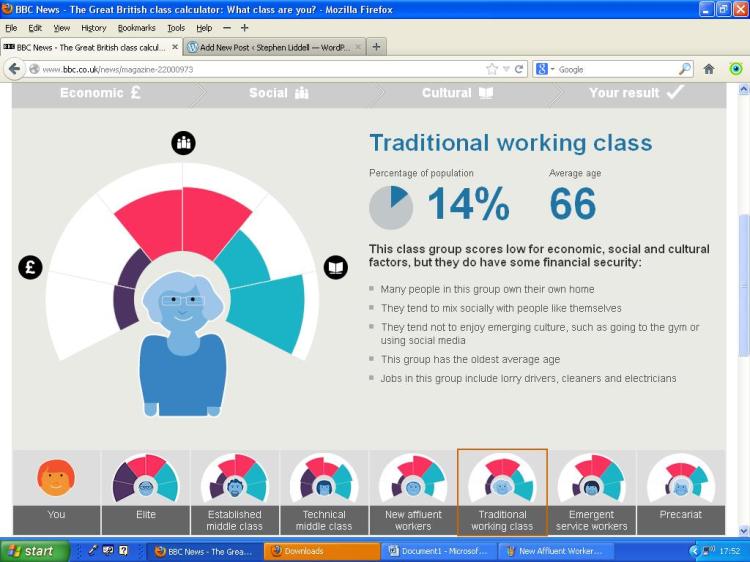
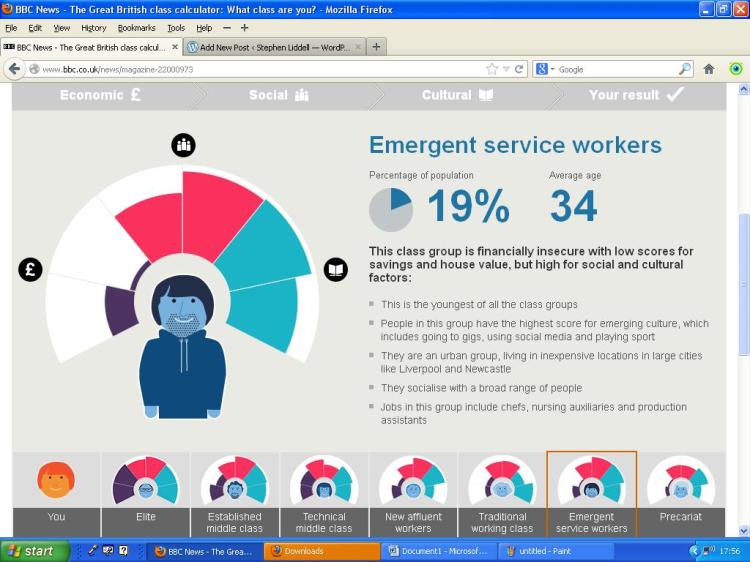
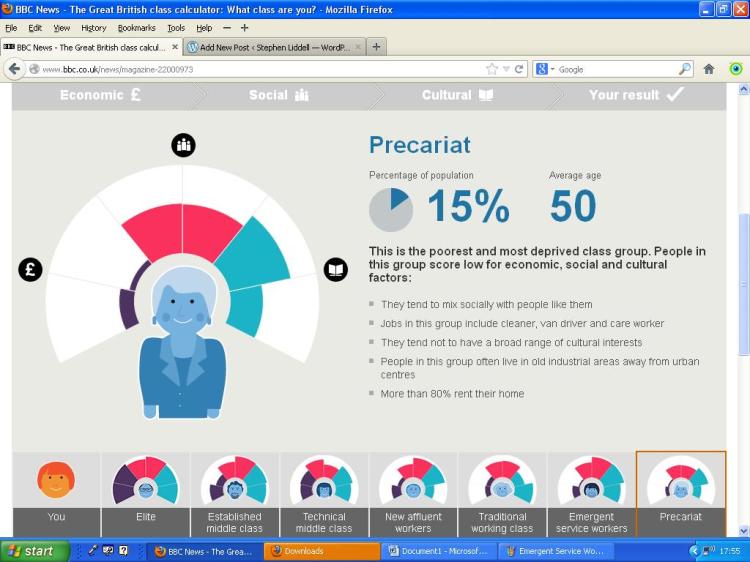
An important factor in the economic health and vibrancy of a nation is the extent to which one can change their social status. In the United States this is what is known as the American Dream. The idea that someone can arrive in the USA penniless and either work their way up themselves or in a generation or two. However since sometime in the 1970’s the USA has fallen behind many European countries which is a surprise given how leaving Europe to live in the USA was for over a century a very popular ambition. It is one thing to have a country where those born into wealth stay wealthy but there are problems when those born into poverty stay there.
And what about me? Well to my complete and utter surprise I am classed as being in the Elite. I was quite shocked by this an a little embarrassed so I went over to the Guardian news website (a well-known socialist paper) and was relieved when their journalist stated he too was shocked and embarrassed to be an Elite.
There are a number of reasons why I am surprised as I am in no way rich. I went to a very ordinary school and wasn’t even in the top classes. I live in a former social housing area in a terraced house and my three previous cars have both died in use at the ages of 12-14 years old. I am also and not for the first time unemployed. My grandparents worked as postmen and bus drivers and my parents hail from deprived council estates and small, isolated mining villages respectively.
Whether my survey results are correct or not, it is good news for the U.K. if people like me can still go from the bottom to the middle (or apparently the top of the ladder). What could be behind this? Well despite his background, my father studied hard to become a very qualified engineer and I was the first in my family ever to go to university. We both share the old-fashioned idea of working hard and not wasting our money so that we do more with our small amount of money than people with 3 or 4 times higher salary.
What really helps my score is my social and cultural factors. I have a wide variety of friends, and many of whom are higher achieving than myself which for the purposes of this survey pushes me up. I have always been a dedicated saver and started saving for pensions, shares after doing part time jobs at school. Maybe because I come from a “poor” background I have always been careful with my money and over 20 years it does add up even though my salary has only ever been average by UK standard (which is low by London standards).
Most of all my high rating is I guess because I score 100% on culture and visiting museums, concerts etc which is higher even than traditionally wealthy “elite” people. I have always been one to aspire to do better and certainly not one happy to just go out and spend money on booze or be ashamed of being different or trying to do better for myself. This isn’t a common thing for young men in Britain born into working class backgrounds and is even less common now than it was when I left high school 20 years ago.
I am as happy going to the cinema as to the theatre. I like the sport of the masses (football) as well as more minority sports like cricket or even horse trials. I like Pizza but don’t generally like fast food. I love traditional roast dinners but am more than happy with a sandwich. It is true I am not into consumerism or celebrity lifestyles or reality tv shows and I will be good mannered, polite and refuse to speak with that terribly fake estuary English accent that everyone to Tony Blair has adopted.
Until this new survey came out, I would have said I come from an upper working class background and migrated to a lower middle-class with potential to improve further. Personally I would very much dispute being classed as elite as my socks have more holes in them than Prince Charles would know what to do with. However there seems no getting away from it that in just over a generation “we” have achieved what many who went to America or Australia did too in years gone by.
The fact is that only 39% of the population are now in the traditional 3 classes but the modern political parties are continuing to argue amongst themselves in the same way. No wonder people are disaffected with politics as they are not being represented and funnily enough the percentage of people who are voting in elections isn’t too far from 39% either.
Class may not be as important as it once was but it still is important whether people realise it or not.
The Guardian socialist? They backed the lib dems at the last election and labour before that, Guardian can be called centre-left at best but never socialist!
Aside from that great post, means of production should never be forgotten when classifying class, in my view the main problem when the UK university/BBC class survey.
I posted something similar but less comprehensive here… http://acatheunderground.wordpress.com/2013/04/03/daily-headline-030413/
LikeLike
Thank-you for your comments. Yes you are right of course about The Guardian. I doubt they will back the Lib Dems again any time soon.
Lots of reports these days don’t mention the means of production, maybe as part of the watering down of news and history for sound-bite tv shows but when it comes down to it, that is the key part.
LikeLike
I own the means of production. It is called a desktop computer and a laser printer. You don’t have to be Eilte or even Middle Class to be master of your own destiny. Great article by the way.
LikeLike
Thanks and I love your comment about the desktop computer and laser printer. I wonder what Marx would make of that?!?!
LikeLike
A really interesting post. It’s always a bit difficult to understand the social categories in each culture and you’ve done a really good job explaining Britain. Your comparison of the social classes to race in the US illustrated your point well.
LikeLike
Thank-you. Yes I think race in the US and class in the UK both shouldn’t matter and to many people in daily life it doesn’t but somehow it still does to too many people, even if not shown on the surface.
LikeLike
Well now, I’m Stephen’s dad. Whilst I can probably be accused of being ‘biased’ I can assure everyone that my comments are completely unsolicited.
After reading Stephen’s article, I too went over to the BBC News Magazine website. I answered the questions as honestly as I could; I too was amazed to find that I was a member of the ‘Elite’ class.
I can verify that my father was a bus driver for most of his life, my mother a nurse; my grandfather and his ancestors were all Northumbrian ‘pitmen’ or miners. What could be more working class than that? But, as Stephen will confirm, I am very proud of the fact that my mother helped and coached me to pass the old ‘11+’ examinations and receive an excellent grammar school education. Eventually, after several years of study and a great deal of hard earned ‘experience’, I became a Chartered Engineer.
I can also confirm that Stephen loved his roast dinners; his mother was one of the best cooks I know of. Don’t ever invite him to a roast – at Christmas he has been known to return for ‘thirds’!
But back to the survey, should it not be that education be regarded more highly than money or breeding in determining a person’s status?
A proud father.
LikeLike
Have you read The Secret Diary of Adrian Mole aged 13 3/4? I love the moment when Adrian says, ‘My father thinks he’s left his working-class roots behind, but he hasn’t. He still puts HP Sauce on his toast.’
LikeLike
Not British, but American. I took your test anyway, and I came out Technical Middle Class. Sounds about right.
LikeLike
I thought that would have been that class too. The problem is what people in one country might consider classy is not the case in others. Britain and France are in many ways equal and yet so very different. Thanks for the feedback!
LikeLike
Well that was interesting. Regarding the word usage, I’m “messed up” too! Going to take that test.
LikeLike
If I had to rate your blog, it would definitely be “Elite” rating despite your “messed up” English. Maybe because mine is messed up too 🙂
LikeLike
Very kind of you to say. 🙂
LikeLike
You say this well. I’m English so the class system is home to me, and I have to remember to translate what North Americans mean by ‘class’ – to them it’s about money. To me, your lists of U and non-U make perfect sense.
I’d add two things. One is that a British person who wonders what class phe is, nearly always turns out to be middle-class. Another is that people who have money, but don’t have taste, are called ‘nouveaux riche’ by people too posh to flaunt their old money.
LikeLike
You’re quite right. It would never occur to me to think that someone with lots of money is classy. Style and taste is much more important and even that is not dependent on class though it is often influenced by it.
Upper class people never worry about class as they know they are on top and don’t have to prove anything. Working class don’t really talk about it as they too know where they are and talking about it usually won’t help but yes Middle Class often talk about it to prove they aren’t working class and often because they are desperate to inch closer to upper class status and beat their friends and co-workers.
I think the ‘nouveaux riche’ irritate everyone! That’s what class I would put Mr and Mrs Beckham under.
LikeLike
So would I! Victoria was never posh, despite being called Posh Spice.
Some of my family (a vast clan) are really posh. Tell-tale signs include using the furniture and wineglasses that your parents left to you, buying new upholstery for the chaise longue only when the stuffing inside has fallen out of the holes where feet have rested.
LikeLike
I have only seen a chaise longue in stately homes. I’m not sure one would go in our hallway with its 70’s building style. Not that I wouldn’t mind one!
LikeLike
This post was fascinating! Thanks for all the information!
LikeLike
I’m glad that you liked it.
LikeLike
Very interesting. Some of the perceived breakdown of class is possibly more superficial than real. New Zealand was once called ‘the classless society’ but that was never actually true. My mother was once the downstairs maid in a rather aristocratic household and a very valued retainer. There is now a drift widening the gap between rich and poor, and I can’t help wondering what will emerge at the end of it…
LikeLike
It is the same here with the widening gap between the rich and poor. It is a shame that the newer societies in places like New Zealand and the USA haven’t been able to avoid the same problems that we’ve had here in the UK. I guess that this is because both rich and poor headed off to new lands and as it takes extraordinary individuals not to exploit people or society, those who amass money will always do their best to keep it concentrated in relatively few hands.
LikeLike
I’ve been reading the books of Dr. Richard Florida, and his theories and ideas about the “Creative Class”. Not sure if you’ve read any of his work, but just wondering your opinion on them in relation to your post here?
By the way, a very interesting and enlightening read!
LikeLike
I haven’t read his books but I have read about his ideas of a “Creative Class”. I do think he is on to something when he says that having bohemian neighbourhoods with musicians, artists and crafts is a good way to attract business and money to improve the area generally. I
It has happened in parts of London and other large UK cities and they have even tried to formalise things by having ‘City of Culture’ awards. The main problem I see with it is that those residents that happen to grow up in these areas sometimes can’t afford to buy or rent homes there because all the prices have gone up but overall I think it is a good idea.
LikeLike
I can totally understand that drawback. Not only do these original residents feels forced to move on, so often do the artists. All too often, I’ve seen rundown communities be transformed by an influx of artists, enticed with cheap rents, only to be taken back by property owners and developers, after the artists have prettied it up, and then jack up rents and property prices, forcing the artists and original residents to move on. For most of these artists, moving on to another run-down neighbourhood is a pain, but manageable. For residential families in these transformed areas, being forced to move on is not as easy.
Cheap and easy urban renewal on the backs of creative. I’ve literally seen one such neighbourhood go through such a transformation (rundown, then revitalized by artists, then bring forced out) within a one year period!
LikeLike
I really do agree. It is doable for the creative people to move on and gentrify a new neighbourhood but it just isn’t fair for families to move out of the area.
That is awful about that place where artists were forced out after a year. I guess to an extent it comes with the job even though it shouldn’t.
LikeLike
Interesting post. I’m Australian but lived in the UK for four years. In many ways the old dart felt more foreign to me than Indonesia ever did, where I lived for three years.
Is a classless society possible? Probably not. I remember the lines by Dylan:
I’ve heard you say many times that you’re better than no-one and no-one is better than you.
If you really believe that you know you have nothing to win and nothing to lose.’
LikeLike
That is interesting as I read something similar of an American who went to mainland Europe and settled well and yet found the UK really difficult.
That is a really good quote you remember from Dylan. I like that a lot. Thanks for your comment.
LikeLike
Steven, once again, enlightening and insightful! What a great subject and way to get a conversation going.
How are you doing?
Linda
LikeLike
Thanks Linda. I am doing ok considering. Did quite a bit of church touring in preparation for the funeral on thursday. It’s all a bit draining.
I’ve been reading more of your blog of your holiday in England. It is amazing that you want to come back here after looking for a hotel in Brighton and Lewes. Next time you are over here, look me up and I will show you two more classic English foods,Fish and Chips or a Curry 🙂
LikeLike
Well I took the test and I’m established middle class which, I suppose, is what I expected. Since Stephen has some Anglo-Saxon noble blood it’s right and proper that he’s Elite. Curse those dratted Normans for deposing England’s rightful nobility!
LikeLike
I thought you would be middle class but as I always imagine you to be by better I thought you would be a certainty for elite status if I was. I have tried the test 3 times and don’t seem to be able to get it to change!
LikeLike
A very detailed and interesting essay on British society this is. I am most fond of the British Isles. My ancestry is Anglo-Saxon. I lived in Gloucestershire from 1968-1970, attending a private Christian School in Cheltenham where the other children came from middle-class families. At the time my father was serving in the Canadian Army (he was working at the Communications Centre in Cheltenham those two years) and my mother stayed at home. We lived in a modest rented bungalow in a village called Brockworth. It was always fun to see the reaction from the parents of classmates when they showed up to birthday parties at our house where my mother and father served hotdogs and we played party games like pin the tail on the donkey. Birthday parties at classmate’s homes were often catered and had hired entertainers like magicians and such.
I am not sure what you mean by Britain’s “long history without internal revolutions or wars.” Britain has a very long history of wars and rebellions, if not revolutions. Think of the Wars of the Roses (1455-1485), the English Civil War (1642-1651), the Jacobite Risings (1688-1746), including the Glorious Revolution (1688) which saw King James II deposed and more recently The Troubles in Northern Ireland (late 1960s-1998), for example.
I agree the barriers between the social classes are not as rigid as they were historically. The marriage of Prince William to Kate Middleton comes to mind. This would have been unheard of in the not to distant past. The Middletons are a solidly middle-class and prosperous family, though commoners. That their daughter has married into the Royal Family has advanced their position in society. While US society does not have an aristocracy, lords, ladies, knights, dames, etc., the distinction between Old Money and Nouveau Riche persists. Think of Arnold Schwarzenegger, an Austrian immigrant from a working class background who found success in the entertainment industry and politics in the US and was, for a time, welcomed into the Kennedy family when he was married to Maria Shriver. This advanced his position in US society.
I am looking forward to my next trip to the British Isles this coming September when I am taking two weeks holiday. I do so enjoy walking in the English countryside and visiting the towns and cities. I am not sure I would fit into England’s high society, but I manage just find people of the middle and working classes. 🙂
LikeLike
Thanks for your great comments. I am, certain you’d fit in well in England whatever class you are 🙂
I find it really interesting that there is the old money and new money distinction in the US aswell when it managed to shed the baggage of aristocracy at its inception.
What I meant by the lack of revolutions in Britain is that despite all the wars and uprisings, the ruling class themselves always either managed to retain their position or were replaced by people who were often of a similar class after a century or two were largely accepted in the elite. The main exception to this being 1066 and the blip around Oliver Cromwell. When the more recent events occurred in France or Nazi Germany or with Communism/Facism, being elite was generally a real disadvantage and those that replaced them at the top of society had neither the background or desire to rule as aristocrats. They may have thought they were best to govern but to govern as Communists or anti-monarchists.
LikeLike
I see your point. It is just like Roger Daltrey says in the song “Won’t get fooled again,” by The Who, “Meet the new boss, Same as the old boss.”
LikeLike
Established middle class here as well! Your post brought fragments of Dickens flooding back to me; as an economics student I cannot agree too strongly that class remains very important today, perhaps especially because it is less obvious. However, despite the top 5% who remain as the “elite” of today I am glad that we live in a world where it is possible for people of almost any income background to become academically and culturally educated
Lily
LikeLike
I agree Lily, I think for the time being, the eradication of absolute poverty and the chance for the majority of people to enjoy education and culture is as much as we can realistically hope for.
LikeLike
That, and maybe developing a popular culture than actually encourages academic and cultural education! Then maybe more people would be inspired to aim for the Elite
LikeLike
That is very important I think. So long as people watch reality tv shows and want to appear on X Factor or American Idol then they and the society wont progress. Whatever progress I made I am sure it is because I had “heroes” that were not largely talentless show-offs who think crying on camera and singing out of tune will get them anyway. 🙂
LikeLike
Yeah, reality TV is the dumps. I just don’t get it…
Lily
LikeLike
Instead of endless shows showing people how to make food or dance why not have similar shows of how to do woodwork or have engineering contests to make miniature bridges or steam engines. Something that might be of use to contestants and to the country.
LikeLike
There’s “How its Made” on Discovery but it has small viewership. More shows like that would certainly be good! Though I think that shows about healthy food, or how to be healthy/fit in general, could be very good for most wealthy countries
Lily
LikeLike
Yes, healthy food would do a lot of people a lot of good, especially in this country!
LikeLike
Interesting article! Thanks also for the link to the curious survey. The parallel you suggest between race differences in the US and class differences in the UK isn’t an exact fit. (Unlike class differences, you cannot “live most of your life and not be aware of” racial differences.) But I suppose you mean the comparison in terms of their use as a political device. Politicians in both countries often trot out race and class, usually around election time, to divide people into convenient “us versus them” groups, to highlight supposed policy differences that actually do not amount to much. (Usually as a distraction from something important, like how they’re already spending your grandchildren’s money.)
One of the better descriptions of class I’ve ever heard was given by Lord Hallam, speaking to a hapless Barry Lyndon in the movie of the same name, when Barry was consulting him on how to elbow his way into the upper class:
“My friends are the best people. I don’t mean they’re the most virtuous. Or indeed, the least virtuous, or the cleverest or the stupidest, richest or best born. But the best. In a word, people about whom there is no question.”
LikeLike
I think Lord Hallam was spot on! It is sad how race is always aggravated whenever an election is looming even though on a day to day basis I rarely here it as being at all important. Thanks for your comment.
LikeLike
Very interesting article! I took the test, ending in Elite; I would agree with that assessment, based on the criteria of the test. I am Swiss, but lived in Scotland for several years though I grew up in America; I have a broad understanding of the word class: In America, my understanding of that word was not so much to do with money, but with a certain level of ettiquette. An example: I met an American abroad and she began loudly speaking about subjects that (I was raised to know) a polite person simply does not speak about in public (personal hygiene, for example). I suddenly understood, where I had not really recognized it before, that there were clearly class differences in America. Here in Switzerland it has little bearing as far as I am aware; the farmer and landscape, nature and beauty are highly revered; everyone is expected to be industrious workers whether farmer or banker, and loafers and lacksadaisical are scorned. If there is a “class” system here, it is probably based on education – intelligence and diligence to make the grade in school in order to secure a well-paid position.
LikeLike
Thanks for your comments. I understand where you are coming from with your observations in America. Etiquette and manners are tied in to social class in the U.K. too although it is a complicated relationship.
I think the Swiss system is by far the fairest. If there has to be a class system, then one based on education and diligence seems to be as fair as can be possible, assuming everyone is given equal access to education. Thanks again!
LikeLike
I wasn’t inclined to take the test, but changed my mind when I saw that it’s based on a large survey. Then I changed my mind again, on the test’s first page. It doesn’t allow for several of my realities. A person who owns a house, whose partner rents a different house. A retired person whose partner is disabled and therefore relies on benefits.
LikeLike
I know. I simply refuse to accept I am elite. I live in an ex-council house, drive a 4 year old bottom of the range Kia and am unemployed. Cultured and educated yes, rich, not at all.
Lower middle-class is as high as I can be unless money is totally taken away from the calculations.
LikeLike
That questionnaire reminds me of several that I’ve seen circulating among lesbians (btw I’m a lesbian). ‘How Butch are You?’ which started with things like ‘Do you wear hair ornaments?’ (fair enough) but quickly got to ‘Do you love your cat?’ In other words, this was about how much of a dyke stereotype you are.
In fact the questionnaire about class reminds me of some I’ve seen in magazines. ‘How can you tell if your Child’s on Drugs?’ I like my lowbrow entertainments but there are limits! Like i said, I did have hopes for the class questionnaire but it didn’t work out sensibly for me. Nor for you, it seems.
LikeLike
I think this is a common problem: things are generalised in order to make them “popular” but in doing so they become so generic as to be all but useless.
LikeLike
Apparently, we now have 7 categories of social class now. It now depends on your social status as well a culture, job and education.
LikeLike
I absolutely loved this article, a very interesting read. For the last several years I have been of the opinion that we are technical middle class, but the calculator deems it wrong. I / we scored as Emergent Service Workers, however if I were to put in the wage / house / ownership details that we would have were my wife not absent work permanently due to a fractured vertebrae (I know, sheesh!) we would have scored technical middle class (her as a high school teacher, and me as a middle manager). I think that is a circumstantial flaw at the roots. The class system is rather stupid in my opinion, and I think we better serve ourselves being happy as we are! 🙂 I am me, and that is all 🙂
LikeLike
Thanks for the kind words. Oh I am sorry about your wife. I feel sure you would be established middle class if things were different for her.
I agree, we are all so different with our own interests, who can say what class we really are. Happiness in being yourself is what matters most.
LikeLike